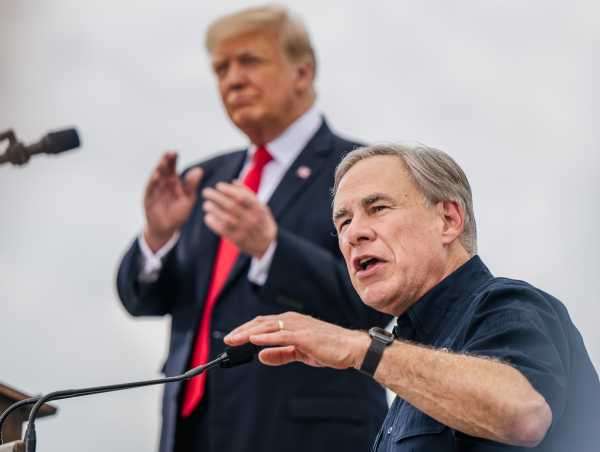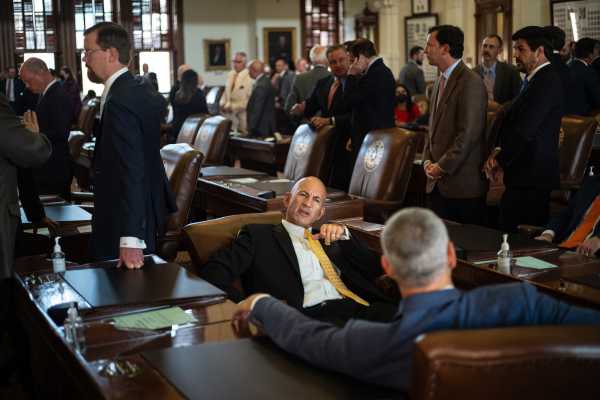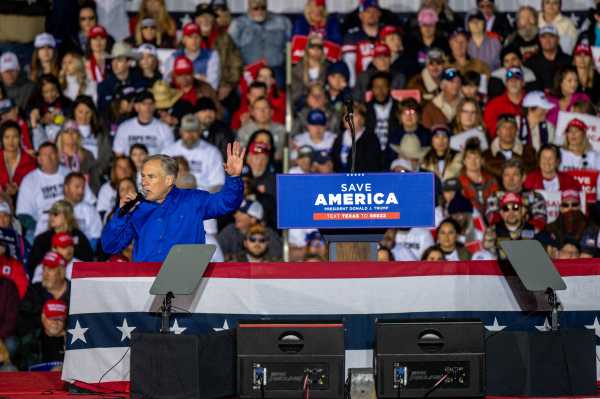
Greg Abbott, Texas’s dependably conservative Republican governor, is running for reelection this year. He’s campaigning on the back of a record packed with recent far-right wins that can help him fend off his most serious challengers, all of whom are coming from his right.
It’s a dynamic that can be seen across 2022’s Republican primary contests, where candidates are clamoring to convince voters that they are the most conservative, most Trump-like option available. And Abbott has given his fellow incumbents a powerful playbook for combating rivals on the right: Pursue an ultraconservative agenda and align yourself as closely as possible with former President Donald Trump.
In Texas, a state where Republicans have held trifecta control for more than two decades, incumbent Republicans like Abbott have more to fear from their own base than from Democrats. That’s especially true in a year where Democrats are facing a challenging midterm election season nationally and President Joe Biden’s low approval ratings have Republicans believing they have an edge with independents and moderates.
The March 1 primary in Texas will therefore likely decide whether Abbott will serve a third term — Abbott is favored in the general election against the expected Democratic nominee, former presidential candidate Beto O’Rourke. Abbott appears poised to win the primary in light of his efforts to prove his conservative bona fides and allegiance to Trump, who remains the most popular Republican in Texas. Abbott’s campaign did not respond to requests for comment.
Abbott has been a staunch conservative for his entire career in Texas politics and made a name for himself by suing the Obama administration at least 44 times. The fact that even he feels pressure to move to the right demonstrates just how much Republicans are at the mercy of their pro-Trump base in 2022. A decadeslong conservative record isn’t enough to persuade Trump voters; they are demanding displays of loyalty to the former president from every incumbent.
“Arguably one of the principal leaders of the national Republican Party, the governor of the largest red state, has felt compelled to leave as little daylight between him and former President Donald Trump as possible, which highlights the extremely dominant role that Trump continues to play within the Republican Party,” said Mark Jones, a political science professor at Rice University.
Over the last year, Abbott led Texas Republicans through one of the most conservative sessions of the state legislature in decades. The GOP majority passed legislation addressing a slew of right-wing priorities — including guns, abortion, “critical race theory,” and sweeping restrictions on voting — in a performance that left little for Texas conservatives to complain about.
Once tepid on Trump, Abbott has also sought to attach himself to the former president. He has backed some of the former president’s key political priorities, like building a wall on the US-Mexico border. Abbott has also repeatedly appeared alongside Trump at public events in the state, earning his endorsement. That’s left his Republican rivals with little oxygen to argue that he isn’t a true Trump supporter, though some top Trump donors have reportedly asked the former president to withdraw his endorsement over concerns about Abbott’s true loyalties.
With just weeks before early voting starts, Abbott’s strategy seems to be working. As of late January, Abbott was leading the field — which also includes ex-Rep. Allen West and former state Sen. Don Huffines — with 59 percent of the vote, according to a University of Texas at Tyler poll for the Dallas Morning News. He only needs 50 percent of the vote in the primary to avoid a runoff election. He also has a double-digit polling advantage over O’Rourke.
“In Texas politics, it’s adapt or die. Greg Abbott didn’t start his career as a right-wing Republican, but he’s certainly ended up there, in part because the party has shifted significantly to the right in the last decade,” said Brandon Rottinghaus, a professor of political science at the University of Houston. “Conservative activists have demanded more conservative policies for years and Donald Trump’s presidency accelerated this trend in Texas.”
Abbott pursued ultraconservative policies in anticipation of challengers from his right
Abbott shaped the agenda for 2021 sessions of the state legislature in which Texas Republicans successfully implemented a slew of their party’s national priorities.

The GOP majority notably passed bills that allow any adult in the state to carry a handgun without a license or permit. It banned abortions after six weeks, in a case that ultimately ended up in the Supreme Court. Texas moved to prevent transgender K-12 students from competing on sports teams that align with their gender identity, and it restricted the way that public school teachers can talk about race and racism in America. The state also passed a bill to prohibit social media companies from removing Texas users based on their political viewpoints, and introduced a slew of new restrictions on voting.
Abbott’s recent record marks a big shift from his last reelection campaign, when he was much more cautious about sticking to bread-and-butter state government issues like property taxes and school finance that wouldn’t offend independents and Democrats. Now, he’s on the front lines of America’s culture war, and has built a national profile that could well propel a rumored 2024 presidential run.
Enacting those national Republican priorities ensured that Abbott’s primary opponents don’t have much ammunition to call him a RINO (Republican in name only), despite their best efforts.
“There’s virtually nothing that Republican primary voters could point to that Abbott did not do,” Jones said. “His entire strategy during the legislative session was to protect his right flank.”
His primary opponents have taken credit for pushing him to the right. Huffines, for instance, said in a statement to Vox that his campaign “forced Greg Abbott’s hand” on the abortion ban and permitless carry — two of the former state senator’s longtime causes — and on the elimination of “critical race theory” in public school curriculums. Huffines said he has also pressured Abbott to send troops to the southern border to address unauthorized migration, as the governor has done through the beleaguered Operation Lone Star.
Huffines is a long-shot candidate, but he’s been making joint campaign appearances with West, and together, they’re a force that Abbott can’t ignore.
“The governor’s primary opponents might not win the primary, but their presence pushed the governor as far to the right ideologically as he’s been since he was elected,” Rottinghaus said.
Abbott has sought to closely align himself with Trump
To further shore up his credentials with the right, Abbott has sought to make himself synonymous with Trump. He has made multiple campaign appearances with the former president, including at a recent rally in Conroe where he said Trump’s name more than two dozen times over the course of a less than six-minute speech. And he has embraced some of Trump’s key political priorities, including militaristic border policies and restrictions on voting rights in the name of what Republicans call “election integrity.”

All of that earned Abbott the former president’s endorsement over Huffines, who has accused the governor of not supporting Trump enough and declared himself the only true Trump candidate in the race, implicitly suggesting Trump made a mistake with his endorsement. Some wealthy Trump donors have shared similar sentiments with the Trump camp, arguing tweets from Abbott campaign political director Mitch Carney that were critical of Trump show the governor is only pretending to be pro-Trump. Carney reportedly retweeted and liked tweets that disparaged Trump’s attempts to undermine the results of the 2020 election.
It’s difficult to say for sure how squarely Abbott is in Trump’s camp. But it was only recently that Abbott went all-in on Trumpism. He didn’t support Trump in the 2016 presidential primaries. When he last sought reelection in 2018, he distanced himself from Trump, fearing that the then-president could turn off potential Latino supporters. And he was notably absent from several border roundtables convened by then-President Trump in Texas.
But Trump has proved to have an iron grip over Texas Republicans, and Abbott needs them to win reelection.
“The Republican Party of Texas now is no longer that weak and compromising party,” Matt Rinaldi, the chair of the Texas GOP, told the crowd in Conroe. “We are the bold party of Donald Trump and will stay that way.”
Trump’s support comes at a price: breathing life into the lie that the 2020 election was stolen from him. For his part, Abbott backed an audit of the 2020 election results in Texas at Trump’s request. (An initial review did not identify any significant issues in the state’s electoral system, though further examination of election records will follow this year.)
And Trump could call on Abbott’s help with obfuscating the results again if he runs for president in 2024. At the Conroe rally, Trump said that Texas is “never, ever turning blue — that is, unless they rig the election.”
“Don’t let them do it, governor,” Trump told Abbott.
Despite closely aligning himself with Trump, some Texas Trump voters still don’t think Abbott has gone far enough. Their complaints center on Abbott’s early measures to curb the pandemic in 2020, including a statewide mask mandate and business closures that he lifted well before other states did the same. They also don’t think that he did enough to further conservative priorities, despite the legislature’s historically conservative 2021 session. For instance, nothing short of a complete ban on abortion would satisfy them.
The GOP’s right wing is putting pressure on incumbent Republican governors
Abbott isn’t the only Republican governor facing pressure from his party’s right wing, and his success thus far has created a model other governors could follow.
Georgia’s Gov. Brian Kemp and Ohio’s Gov. Mike DeWine, for example, are both facing conservative challengers who have tried to make their primaries into contests over loyalty to Trump.

Trump endorsed former US Sen. David Perdue over Kemp, whose close relationship to the former president crumbled when he did not challenge the results of the 2020 election following a state-ordered audit. To shore up Perdue’s chances, Trump even negotiated with another Republican candidate, Vernon Jones, to drop out of the race, endorse Perdue, and instead run for Congress.
Former US Rep. Jim Renacci has also secured a Trump endorsement over DeWine, a more traditional conservative who has at times clashed with his party’s right wing, particularly on the pandemic. Brad Parscale, Trump’s former campaign manager, is advising Renacci’s campaign.
“Jim Renacci’s the only Trump candidate,” Parscale told Politico. “And it is clear from the data that Mike DeWine is the anti-Trump candidate.”
DeWine didn’t carry out a blitzkrieg of conservative policy priorities in the Ohio legislature the way Abbott did in Texas, but he has been more cooperative with right-wing state lawmakers on issues spanning from redistricting to gun control over the last year. For his part, Kemp has offered up a proposal to allow Georgians to carry a concealed handgun without a state license as bait for Republican voters — but only after Perdue unveiled a similar proposal weeks before and criticized him for not taking more action on gun rights.
At the moment, these moves seem as though they may help both governors hang onto power. DeWine, who didn’t even try to publicly court Trump’s endorsement, held a healthy 41 to 23 percent lead over Renacci in one recent Trafalgar Group poll. And before Jones dropped out, Kemp was leading the primary, with 43 percent support to Perdue’s 36 percent in a Quinnipiac University poll. But it’s possible that Jones’s supporters could bolster Perdue’s numbers and make the race much closer.
Even incumbents who aren’t seeking reelection have felt pressure from the right flank. Massachusetts Gov. Charlie Baker, a moderate who has been critical of Trump, decided not to run for a third term this year due in part to his party’s rightward shift and the prospect of facing a conservative primary challenger endorsed by the former president.
Will you support Vox’s explanatory journalism?
Millions turn to Vox to understand what’s happening in the news. Our mission has never been more vital than it is in this moment: to empower through understanding. Financial contributions from our readers are a critical part of supporting our resource-intensive work and help us keep our journalism free for all. Please consider making a contribution to Vox today.
Sourse: vox.com